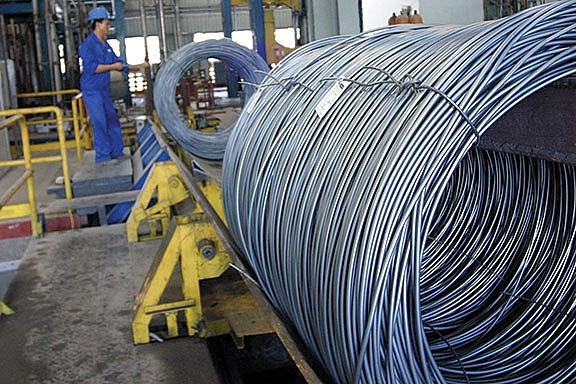Flexible response needed to proposed US aluminum and steel tariffs
 |
| Steel export to US market might face 53 per cent import tariff |
Early this month, US President Donald Trump said that his administration will impose tariffs on steel and aluminum imports to shore up struggling local industries.
Addressing leading US steel firms, Trump has pledged to reconstruct the US’ steel and aluminum industries which supposedly have been facing ‘unfair’ treatment from other countries in the last decades.
According to figures from the World Steel Association (WSA), US companies use up to 100 million tonnes of steel every year, one third of which is imported.
The US also uses about 5.5 million tonnes of aluminum, 90 per cent of which is imported.
Imported steel and aluminum were therefore the core materials to feed major US industries like car and airplane manufacturing or consumer goods production.
Also according to WSA, the top 10 steel exporters to the US are Canada, Brazil, South Korea, Mexico, Turkey, Russia, Japan, Germany, China, and Taiwan.
| Vietnam is placed 12th in steel exports to the US. With respect to aluminum exports, Vietnam is behind Canada and Mexico. |
Vietnam is placed 12th in steel exports to the US. With respect to aluminum exports, Vietnam is behind Canada and Mexico.
Earlier, the US Department of Commerce (DOC) assumed that rising steel and aluminum imports could threaten national security.
The US has conducted a Section 232 investigation under the authority of the Trade Expansion Act of 1962 for the purpose of national security.
The inspection report has also proposed the application of one of the three following restriction measures.
The first scenario involves the proposed application of at least 53 per cent import tariff on the 12 largest steel exporters to the US (Vietnam included) and a quota regime to all remaining countries.
In the second scenario, the US would propose applying a 63 per cent quota scheme to all imported steel products.
The third scenario involves the proposed application of at least 24 per cent tariff on steel imports globally.
In a recent talk with the VIR, a Vietnam Steel Association (VSA) representative said that they are penning reports to the government and the Ministry of Industry and Trade about the situation as well as proposing remedial plans.
These documents will soon be forwarded to the government in order to search for suitable rectification measures.
In fact, Vietnamese coated iron and steel products exported to the US account for a mere 1.6 per cent of the US’ total steel import volume, fetching around $400 million.
Currently, leading Vietnamese steel exporters to the US are Ton Hoa Sen, Ton Nam Kim, and Ton Dong A JSCs.
Several other firms such as Ton Phuong Nam, BlueScope Vietnam, Phu My Steel or Hoa Phat Steel have penetrated the market mainly through export processing for foreign partners or are currently conducting initial market survey.
Experts assumed that with the first scenario (53 per cent import tariff), made-in-Vietnam products could not compete with similar items from countries not applied the tariff or US products.
With the second and third scenarios, the losses of the Vietnamese steel industry might be lower, but it could hamper the sector’s development in the future.
“We focus on the domestic market, so the implications of the tariff (if it is applied) would not be too disruptive. We, however, are trying to diversify input markets to mitigate risk, instead of just concentrating on traditional markets,” said a steel firm of medium size, wishing not to be named.
What the stars mean:
★ Poor ★ ★ Promising ★★★ Good ★★★★ Very good ★★★★★ Exceptional
Related Contents
Latest News
More News
- State corporations poised to drive 2026 growth (February 03, 2026 | 13:58)
- Why high-tech talent will define Vietnam’s growth (February 02, 2026 | 10:47)
- FMCG resilience amid varying storms (February 02, 2026 | 10:00)
- Customs reforms strengthen business confidence, support trade growth (February 01, 2026 | 08:20)
- Vietnam and US to launch sixth trade negotiation round (January 30, 2026 | 15:19)
- Digital publishing emerges as key growth driver in Vietnam (January 30, 2026 | 10:59)
- EVN signs key contract for Tri An hydropower expansion (January 30, 2026 | 10:57)
- Vietnam to lead trade growth in ASEAN (January 29, 2026 | 15:08)
- Carlsberg Vietnam delivers Lunar New Year support in central region (January 28, 2026 | 17:19)
- TikTok penalised $35,000 in Vietnam for consumer protection violations (January 28, 2026 | 17:15)

 Tag:
Tag:


























 Mobile Version
Mobile Version